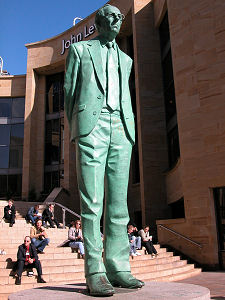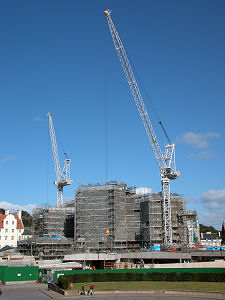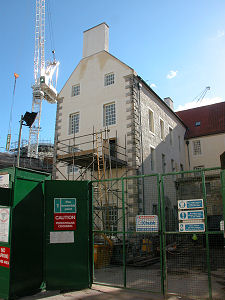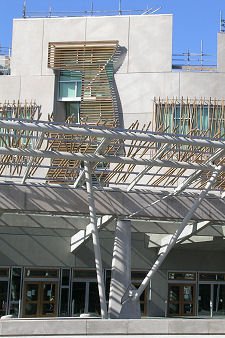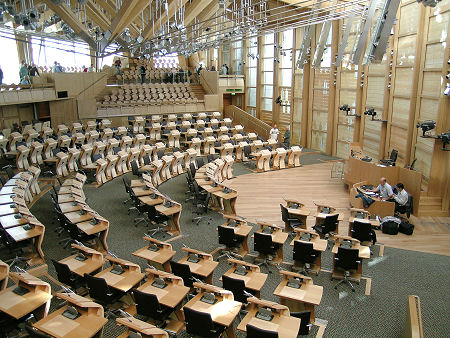 Debating Chamber of the Scottish Parliament |
The political life of Scotland is related to, but in many ways increasingly distinct from, the political life of the United Kingdom (UK) more widely. The countries of Scotland, Northern Ireland, Wales and England together form the United Kingdom, and authority over the UK as a whole is exercised by the UK Parliament sitting in Westminster. The head of state is HM the Queen.
The UK Labour Government that came to power in 1997 did so with a mandate to pursue constitutional change and, in particular, to develop proposals for devolving power in Northern Ireland, Wales and Scotland. As a result the Secretary of State for Scotland in the newly elected UK Labour Government, Donald Dewar, oversaw a referendum on devolution, which took place on 11 September 1997.
Scots were asked two questions. The first was on the principle of establishing a separate Parliament for Scotland. The second was whether that Parliament should have the power to vary levels of taxation. 74.3% voted yes to the first question, and 63.5% voted yes to the second question. As a result a devolved government came into being in 1999 and the Scottish Parliament resumed sitting, for the first time since it voted itself out of existence by approving the Act of Union in 1707. Donald Dewar became Scotland's first First Minister.
The Scottish Parliament is a unicameral legislature with 129 Members or MSPs. 73 of these represent individual constituencies and are elected on a "first past the post" system, while the other 56 are elected in eight different electoral regions by the "additional member" system.
Rather than set out a list of powers to be transferred from the UK Parliament to the Scottish Parliament, the Scotland Act 1998 set out a list of "reserved matters", control of which would be retained by the UK Parliament: and control over all other matters was devolved to the Scottish Parliament. The list of "Reserved Matters" included: constitutional issues; foreign policy; defence and national security; fiscal and economic policy; immigration; energy; competition; broadcasting; health and safety; equal opportunities; gambling; some aspects of transport; data protection; firearms; extradition; emergency powers; treason; time zones; and weights and measures.
This may seem a long list, but there are many important areas of policy not included in it, and therefore devolved by the UK Parliament to the Scottish Parliament. These include: health; education; economic development; planning; aspects of transport; local councils; housing and regeneration; social work; agriculture; arts and culture; environment; justice; fire; police; prisons; social inclusion; voluntary sector; tourism and sport.
In strictly legal terms, sovereign authority over all matters remains with the UK Parliament in Westminster, which has the right to decide to extend, reduce, or even abolish altogether the range of powers devolved to the Scottish Parliament. In practical terms, ending devolution without an extremely clear mandate (probably a referendum) seems a step no UK Government would be prepared to take. But "fine tuning" of devolution can and does take place, for example when responsibility for railways in Scotland was removed from the list of reserved matters, thereby devolving it to the Scottish Parliament at Holyrood.
In its early years, devolution produced some notable differences between policies implemented in Scotland and England. The three most obvious were the abolition of tuition charges for Scottish students studying in Scottish Universities; free personal care for the elderly; and an earlier and more complete ban on smoking in public places being imposed in Scotland than eventually happened in England.
Nonetheless, relations between the UK Government and the Scottish Government remained very close so long as the Labour Party was in control of both. But in the Scottish Parliamentary Election of 2007, the Scottish National Party emerged with the largest number of seats and was able to form a minority government in coalition with the Green Party. The result was more, and more obvious, differences of view between the Scottish Government and the UK Government, but devolution continued to work effectively for Scots. Matters polarised further following a win by a Conservative and Liberal Democrat coalition in the 2010 UK General Election, and then in the 2011 Scottish Parliamentary Election the Scottish National Party gained an overall majority. This led, amongst other things, to the vote on whether Scotland should become an independent country in September 2014. The result was a "no" vote, by 55% to 45%, a rather narrower margin than most commentators suggested might be possible.
In the 2016 elections to the Scottish Parliament, the SNP again emerged with the largest number of seats, though without an overall majority. The party went on to from a minority government under First Minister Nicola Sturgeon. The issue of Scottish independence looks set to continue to have a high profile following the 2016 UK referendum on European Union membership. The UK as a whole voted narrowly in favour of leaving the EU, while Scotland voted quite significantly in favour of staying in the EU.
The 2021 Scottish parliamentary elections again resulted in the SNP taking the largest number of seats; and an overall majority was subsequently gained through a power sharing agreement with the Green Party.
Scotland has four main political parties. Three of them, Labour, Conservative and Liberal Democrat, mirror the three main parties active across the UK. However, in Scotland the Scottish National Party has added a fourth dimension in Scottish politics since the party won its first Westminster seat in a by-election in November 1967. In the 2019 United Kingdom general election the SNP emerged with 48 out of 59, or 81% of Scotland's Westminster seats.
The benefits of devolution are much less easy to see from an English perspective. On 14 November 1977, the Labour Westminster MP for West Lothian, Tam Dalyell used a Parliamentary debate on devolution to pose what has since become known as "The West Lothian Question":
"For how long will English constituencies and English Honourable members tolerate... at least 119 Honourable Members from Scotland, Wales and Northern Ireland exercising an important, and probably often decisive, effect on British politics while they themselves have no say in the same matters in Scotland, Wales and Northern Ireland?"
In the House of Lords in Westminster, hereditary Scottish Peers are eligible alongside their English counterparts to vote in and be nominated for the representative seats available in the House of Lords. And at the European level, Scotland makes up a single constituency, returning six Members of the European Parliament, or MEPs.
Local Government in Scotland comprises 32 unitary authorities, each governed by a council made up of councillors who stand for election every four years. Councils vary widely in population, from Glasgow with just under 600,000 residents to Orkney with just under 20,000: and in size, from Highland covering 26,484km² to Clackmannanshire covering just 158km². There are in total 1,223 Councillors serving in Scotland's Councils.

